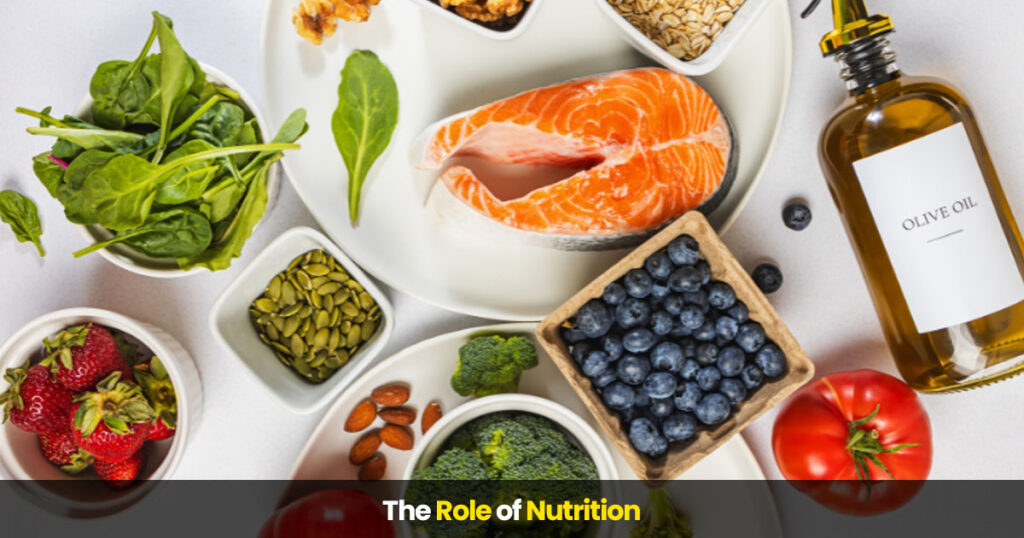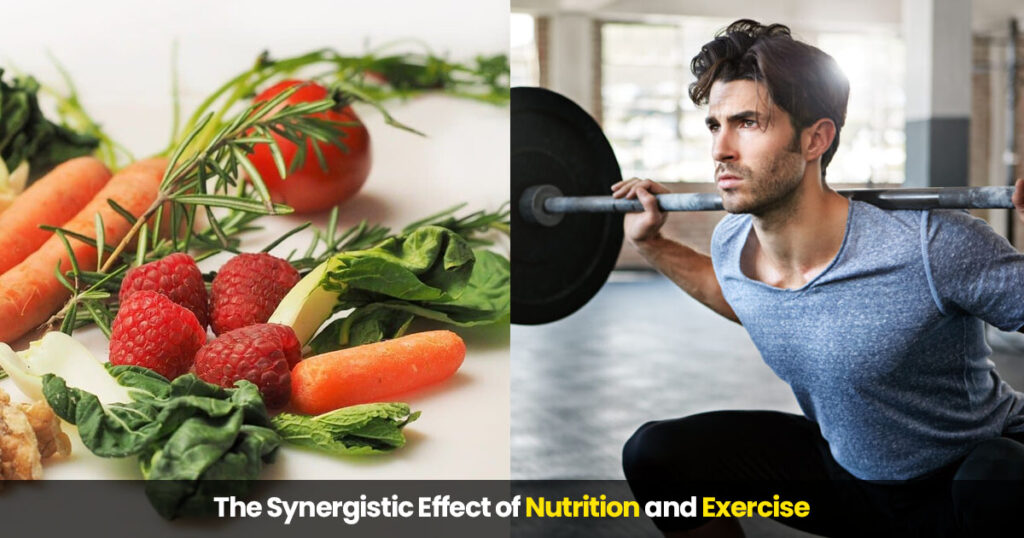We still need to answer the age-old question of whether food or exercise is more important when it comes to losing weight. Though complementary, success depends on your ability to recognize each’s unique value and how they work together.
1. The Role of Nutrition

Nutrition, the study of food and how the body uses it, supports a person’s overall health and wellness. A balanced diet includes water, carbs, proteins, fats, vitamins, and minerals, all necessary for the body to function properly.
Key Roles of Nutrition
1- Energy Production
- Carbohydrates: The body’s principal fuel source, particularly for cognitive processes and physical exertion.
- Fats serve as a concentrated energy source, aid in the production of hormones, and provide insulation.
- The building blocks of tissues—proteins—play an important role in the creation of enzymes and the immune response, among other biological processes.
2- Growth and Development
- The development and maintenance of tissues rely on proteins.
- Bone health and development depend on calcium and vitamin D.
- Red blood cell formation and oxygen transport both rely on iron.
3- Immune Function
- Minerals and vitamins bolster the defenses against illness.
- Protein: Required for antibody synthesis.
4- Hormone Regulation
Fats: Involved in the production of hormones.
Vitamins and Minerals: Support the endocrine system’s function
5- Mental Health
- Omega-3 Fatty Acids: Linked to improved brain function and mood.
- B Vitamins: Essential for neurotransmitter production
The Impact of Poor Nutrition
Many health issues can develop as a result of inadequate nutrition, including:
- Malnutrition: It can lead to delayed physical development, compromised immunity, and an increased risk of contracting illnesses.
- Obesity: Health problems associated with excess body fat can develop from eating poorly and consuming too many calories.
- Saturated and trans fats are associated with an increased risk of coronary heart disease.
- One risk factor for developing type 2 diabetes is leading an inactive lifestyle and eating poorly.
- Eating a diet high in processed foods and low in fresh produce increases the risk of developing some malignancies.
Tips for Optimal Nutrition
- Eating a large style of foods from each food group is important for a diet.
- Avoid overeating by being attentive to portion proportions.
- Prefer whole, unprocessed foods and cut back on processed ones.
- Hydration: Stay hydrated all day long by drinking lots of water.
- In order to keep blood sugar levels steady, it is important to eat meals and snacks at regular intervals.
- Get Expert Opinion: For tailored nutritional recommendations, speak with a certified nutritionist.
You can fuel your body, improve your health overall, and boost your quality of life by emphasizing nutrition.
2. The Role of Exercise

Regular exercise, an essential component of any healthy lifestyle, enhances both physical and mental well-being. Engaging in regular physical activity has the potential to greatly enhance one’s standard of living.
Key Benefits of Exercise
1- Physical Health
- To keep the weight off, it’s a good idea to exercise regularly since it burns calories.
- Strength Training: By increasing muscular mass, strength training enhances both the strength and endurance of the body as a whole.
- Protect your bones against osteoporosis by engaging in weight-bearing exercises like jogging, jumping, and lifting weights.
- Lowering blood pressure, lowering harmful cholesterol, and improving heart health are all benefits of regular physical activity.
- A better night’s sleep is one of the many benefits of regular exercise, which also helps control sleep cycles.
2- Mental Health
- Regular physical exercise can alleviate both anxiety and stress.
- Exercise elevates mood by releasing endorphins, which alleviate depressive symptoms and raise general well-being.
- Consistent physical activity can enhance memory, focus, and problem-solving abilities.3
3- Disease Prevention
- Cardiovascular disease, stroke, type 2 diabetes, and several cancers are all chronic conditions that regular exercise can help reduce.
- Enhanced Immune Function: Engaging in regular physical exercise can fortify the immune system, reducing vulnerability to disease.
Types of Exercise
- Exercises like jogging, swimming, cycling, and dancing are examples of aerobic exercise since they raise the heart rate and the respiratory rate.
- Lifting weights and using resistance band exercises are examples of strength training.
- Exercises for Flexibility: These include movements and poses that increase mobility and flexibility, such as Pilates and yoga.
Tips for Incorporating Exercise into Your Routine
- Start Slowly: Work up to longer and more intense workouts after you’ve mastered moderate-intensity workouts.
- Get Involved in Things You Love: Pick things to do that both entertain and inspire you.
- Plan Achievable Objectives: Write down attainable objectives and keep tabs on your progress.
- Establish a Routine: Set aside time each week to exercise, and don’t budge from that.
- Pay Attention to Your Body: Take breaks when you feel you need to.
Make exercise a regular part of your routine to improve your health in many ways.
3. The Synergistic Effect of Nutrition and Exercise

Exercise and nutrition together have a greater impact than either alone. The synergistic effect describes this behavior. Making the most of both parts of your lifestyle opens up health possibilities.
How Nutrition and Exercise Work Together
1. Enhanced Weight Management
- Losing weight is as simple as maintaining a calorie deficit through a combination of a healthy diet and frequent physical activity.
- The combination of regular exercise and a nutritious diet promotes lean body mass while reducing excess fat.
2. Improved Body Composition
- Lean Muscle Mass: A protein-rich diet and strength exercise work hand in hand to produce muscle.
- Aerobic activity burns calories, which contributes to a reduction in body fat.
3. Boosted Metabolism
- Metabolic Rate Boost: When you exercise regularly, your basal metabolic rate rises, which means that even when you’re not moving around, your body is burning more calories.
- Maximizing Nutrient Utilization: The building blocks for a healthy metabolism are the nutrients found in a well-balanced diet.
4. Enhanced Cardiovascular Health
- Reduced Blood Pressure: A healthy diet and regular exercise can help lower blood pressure.
- A healthy lifestyle, including regular exercise and a well-balanced diet, can lower cholesterol levels.
- Using both of these strategies together can significantly lower the risk of cardiovascular disease.
5. Improved Mental Health
- Reducing tension: Eating well and exercising regularly can help alleviate stress and anxiety.
- Feeling Better: Eating well and doing regular exercise can improve your mood and lessen the impact of depression.
- Improved brain health and cognitive performance can be achieved through regular exercise and a healthy, well-rounded diet.
Key Takeaways
- Eat a Variety of Nutrient-Dense Foods: Fruits, Vegetables, Lean Meats, Whole Grains, and Healthy Fats Should Be Your First Priority When Planning Your Diet.
- Exercise Consistently: Strive to exercise for a minimum of 150 minutes per week at a moderate level.
- Keep Yourself Hydrated: Sip on plenty of water all day long.
- Prioritize getting a decent night’s sleep to help with your health and recuperation in general.
- Take Control of Your Stress Levels: Try some yoga or meditation to lower your stress levels.
Optimal health, increased vitality, and an improved quality of life can be yours with the help of a balanced diet and frequent exercise.
Conclusion
A false dichotomy exists in the argument over exercise vs. healthy eating. In order to reach and stay in the best possible health, both are essential. Unleash your full potential and live a healthier, happier life by prioritizing a balanced diet and regular physical activity. Things aren’t about being flawless, but rather about making progress. Making small, sustainable changes can significantly improve your well-being.

